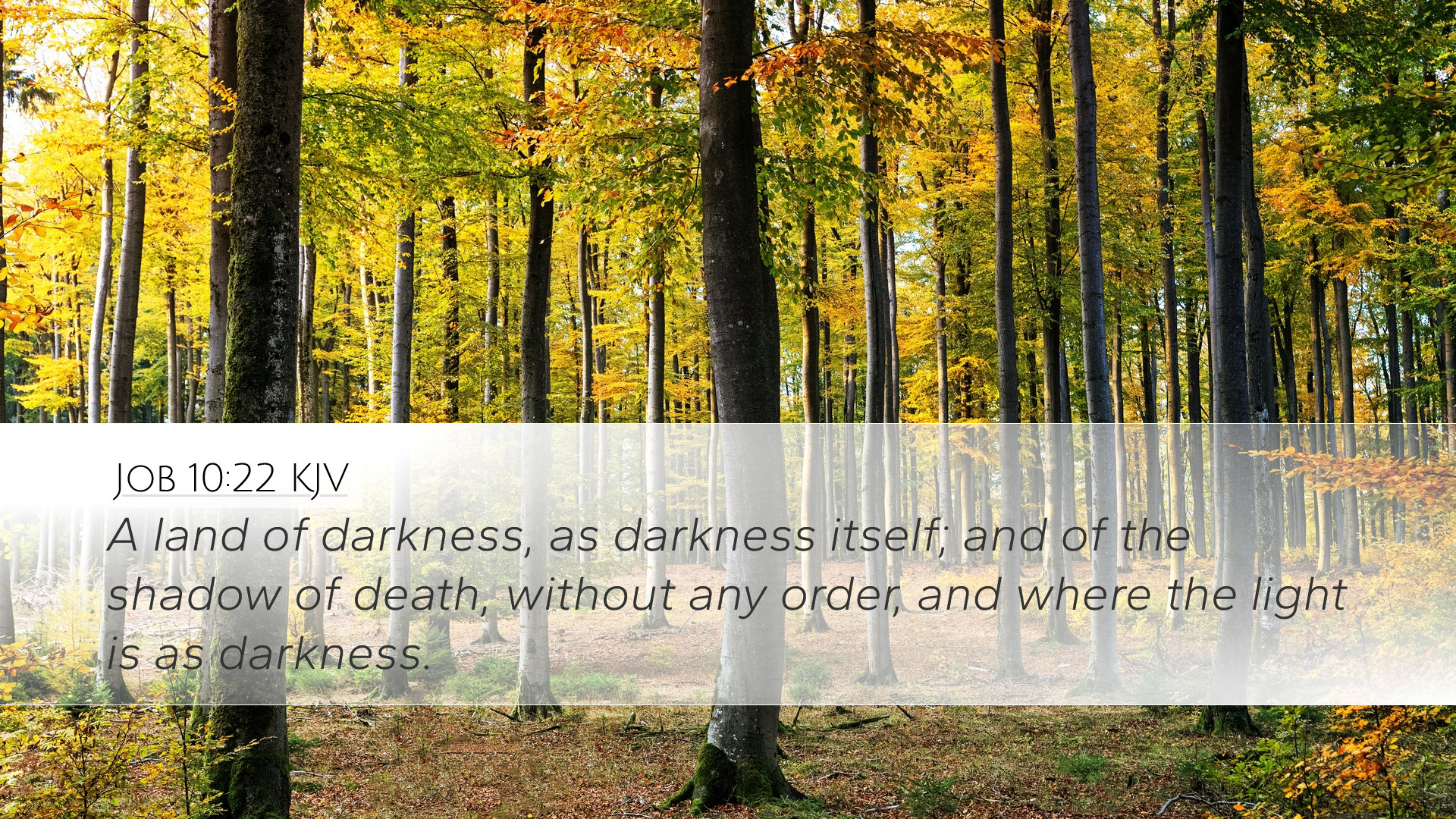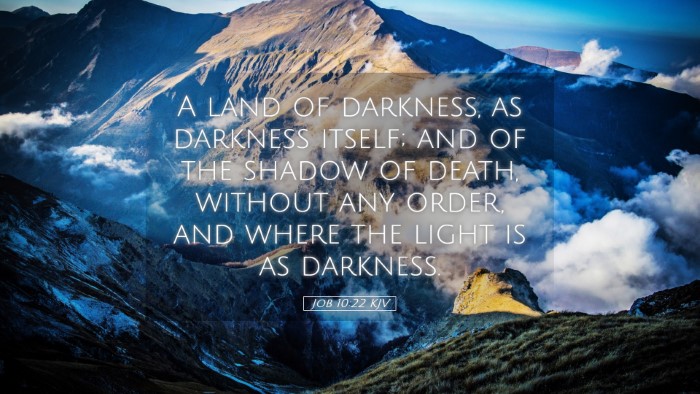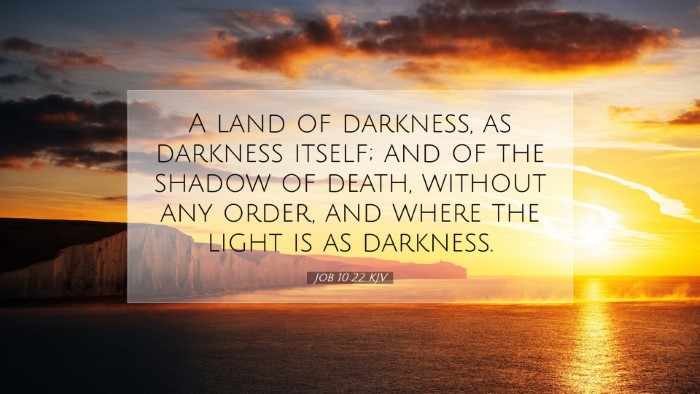Old Testament
Genesis Exodus Leviticus Numbers Deuteronomy Joshua Judges Ruth 1 Samuel 2 Samuel 1 Kings 2 Kings 1 Chronicles 2 Chronicles Ezra Nehemiah Esther Job Psalms Proverbs Ecclesiastes Song of Solomon Isaiah Jeremiah Lamentations Ezekiel Daniel Hosea Joel Amos Obadiah Jonah Micah Nahum Habakkuk Zephaniah Haggai Zechariah MalachiJob 10:22
Job 10:22 KJV
A land of darkness, as darkness itself; and of the shadow of death, without any order, and where the light is as darkness.
Job 10:22 Bible Commentary
Commentary on Job 10:22
Verse Context: Job 10:22 states, "A land of darkness, as darkness itself; and of the shadow of death, without any order, and where the light is as darkness." This verse occurs during Job's poignant appeal to God as he struggles to understand the suffering he endures.
Introduction
The Book of Job presents profound questions of human suffering, divine sovereignty, and the nature of faith. Job 10:22 captures a moment of deep despair, where Job likens his circumstances to a land enveloped in darkness. This commentary synthesizes insights from prominent public domain commentaries to illuminate the depth and implications of this verse.
Exegesis of Job 10:22
Matthew Henry's Commentary: Henry places emphasis on Job's lamentation as he confronts the seemingly silent heavens. He interprets the 'land of darkness' as a representation of Job's feelings of abandonment and despair. The 'shadow of death' denotes not only a physical threat but also a spiritual demoralization. Henry notes that Job experiences a world devoid of hope, where the absence of order reflects the chaos that accompanies profound suffering.
Albert Barnes' Notes: Barnes elaborates that the 'darkness' Job speaks of is figurative, denoting the confusion and trouble in his life. He draws attention to the implication that without divine illumination, life is fraught with despair and hopelessness. Barnes points out that the comparison of 'light' being as 'darkness' highlights the severity of Job's plight—his inability to see any path forward amidst his trials. Such expressions resonate with readers who face their own periods of darkness.
Adam Clarke's Commentary: Clarke offers a detailed investigation of the terms used in this verse. He notes that 'darkness' symbolizes not only a physical absence of light but also ignorance and the trials that generate fear and uncertainty. Clarke suggests that Job's metaphorical land is representative of a life that is filled with anguish and devoid of clarity. He emphasizes that Job is not merely voicing lament; he is engaging in a profound theological reflection on his existence in relation to God's will.
Theological Implications
In analyzing Job 10:22, several theological themes emerge:
- The Problem of Suffering: Job’s candid expression of despair raises questions about the nature of suffering and God’s presence within it. The duality of light and darkness encapsulates the struggle believers face in reconciling faith with adversity.
- The Sovereignty of God: Job’s inquiry into God's justice reflects a deeper wrestling with divine sovereignty. Despite his feelings of abandonment, Job’s monologue suggests an underlying acknowledgment of God’s supreme authority.
- The Need for Divine Revelation: The imagery of darkness signifies a yearning for truth and understanding. As Job navigates his suffering, there is an implicit call for God's revelation to bring meaning and light into his dark circumstances.
Pastoral Application
For pastors and leaders, Job 10:22 serves as a powerful reminder of the pastoral care necessary for those in deep suffering. The following applications emerge from the verse:
- Empathy in Suffering: Understanding that congregants may feel as Job does—lost in darkness—encourages leaders to listen and support without offering simplistic answers.
- Encouraging Vulnerability: Job's willingness to express his anguish provides a model for openness in prayer and conversation with God. Pastors should create spaces where individuals can voice their struggles without fear.
- Affirming Hope in Despair: While despair may feel overwhelming, the message of hope and the eventual restoration of Job reminds us to direct others towards God’s promises of presence, guidance, and comfort.
Scholarly Reflection
For theologians and scholars, Job 10:22 presents rich material for exploration. It encourages rigorous investigation into the nature of lament and its place within faith. Here are pertinent areas for further study:
- The Landscape of Lament: Examining how lament functions throughout the Psalms and other Biblical texts can provide deeper insight into Job’s expression.
- The Relationship between Light and Darkness: Analyzing the symbolism of light and darkness in Biblical literature can unpack the existential questions raised in Job.
- The Intersection of Theology and Human Experience: Delving into how Job's experiences reflect broader themes of human suffering, divine silence, and the quest for understanding God’s nature.
Conclusion
Job 10:22 is a profound poetic expression of despair that resonates across the ages. With its complex imagery and heartfelt emotion, it serves as a focal point for discussions of human suffering, divine sovereignty, and the essence of faith. By engaging with the insights provided by esteemed commentators and recognizing the relevance of this verse in both pastoral and scholarly contexts, readers can cultivate a deeper understanding of their own faith journeys amid life's darkest moments.


